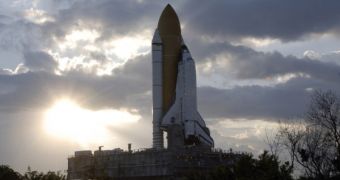In spite of the uncertainties plaguing the future launch of space shuttle Atlantis, the spacecraft was rolled out to its launch pad early on Wednesday, in anticipation of its November take-off date. It will take to the International Space Station (ISS) from Launch Pad 39A at the Kennedy Space Center (KSC), in Cape Canaveral, Florida, the only pad still in operation capable of handling shuttles and their external tanks. In spite of the optimistic maneuver, it still remains to be determined when the craft will fly, or whether it will be launched this year at all, Space reports.
There are severe difficulties facing Atlantis in its quest for launch, NASA officials say. The increased space traffic, the incoming meteor showers, and a very narrow launch window may force mission planners to either delay the launch, or move it to next year altogether. Between November 21 and December 5, the orbital facility will receive sunlight from an angle that will not allow it to generate sufficient electricity to support a docked shuttle. Additionally, the station would be unable to dissipate the heat that such a maneuver would generate.
The work engineers had to perform to ensure that the shuttle would be ready for operations was also made difficult by the fact that the initial testing of NASA's new rocket, the ARES I-X, is scheduled to take place on October 27. The new delivery system will use the Launch Pad 39B at the KSC, which has been passed on to Project Constellation after Atlantis returned from its mission to repair the Hubble Space Telescope, in May.
“We still have some negotiating to do. Whatever day it ends up being, we're getting ourselves in a position to be ready to launch,” Allard Beutel, a spokesperson for NASA, said. Yesterday morning, the rollout maneuver began at 6:38 a.m. EDT (1038 GMT), and it took nearly seven hours for the shuttle, its external fuel tanks, and the gigantic Crawler Transporter vehicle to make the 3.4-mile trek to Launch Pad 39A. The whole ensemble weighed some 12 million pounds (5.4 million kilograms), and could move at a speed of about one mile per hour. The rollout began a bit behind schedule, as engineers attempted to fix some inevitable last-minute glitches.
Adding to Atlantis' troubles, the Leonid meteor shower will peak on November 17, followed by the Geminids, on December 13-14. A new communication satellite will be launched from a United Launch Alliance Atlas 5 rocket on November 14, followed, four days later, by a Delta 4 rocket launch. To top things, the US Air Force Eastern Range, the installation that provides space-tracking capabilities for all launches from the Kennedy Space Center and the Cape Canaveral Air Force Station, in Florida, needs between 24 and 48 hours to reset its systems.

 14 DAY TRIAL //
14 DAY TRIAL //